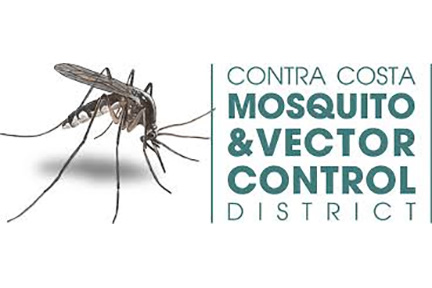CONCORD, CALIFORNIA – The Contra Costa Mosquito & Vector Control District (District) reports more mosquitoes have tested positive for West Nile virus (WNV) in Contra Costa County. The mosquitoes were collected from a trap in an agricultural area east of Brentwood.
This is the second group of mosquitoes to test positive for WNV so far this year in Contra Costa County. A previous group of mosquitoes that tested positive for WNV was from Oakley.
The news of more WNV-infected mosquitoes comes a week after the District announced the discovery of an invasive mosquito species in Contra Costa County. Aedes aegypti mosquitoes can transmit the causative agents of Zika virus, Dengue fever, Chikungunya virus, and Yellow fever, making it even more important that all Contra Costa County residents take steps to tip, toss and take action to reduce the risk of mosquitoes.
- Tip over any size outdoor container to toss out any amount of standing water
- After tossing out the water, take action by scrubbing the inside of any outdoor container because Aedes aegypti eggs can stick to bird baths, buckets, outdoor pet dishes, garden pots for plants, and anything else that can hold water outdoors.
- And report mosquito issues by calling (925) 685-9301 or online.
“The source of mosquitoes is often right in our own backyards. That’s why we’ve always provided residential inspections, and now that we’ve discovered invasive Aedes aegypti, we are going door-to-door in the affected area to conduct inspections and treatment if necessary, in an effort to prevent this mosquito from spreading across Contra Costa County. Backyard inspections are critically important when it comes to Aedes aegypti because they are tiny mosquitoes that are well adapted to living around our homes, depositing eggs in almost any container that can hold water. The key to controlling them is to find, drain these containers and keep them dry because a single missed source could re-infest an entire neighborhood,” said Steve Schutz, Ph.D., Scientific Program Manager.
In addition to dumping out and scrubbing outdoor sources of standing water, the District recommends residents use EPA-registered insect repellents when mosquitoes are present. The most effective repellents contain one of the following active ingredients:
- DEET
- Picaridin
- Oil of Lemon Eucalyptus.
Always follow the instructions on the label when using an insect repellent.
WNV is a virus that comes from certain birds, mostly crows and jays. Mosquitoes become infected after biting an infected bird. Contra Costa County residents can report dead birds by phone at (877) WNV-BIRD (968-2473) or online. County residents can also request mosquito service for residential property by calling (925) 685-9301 or online.
Since 2005, 75 people in Contra Costa County have been diagnosed with West Nile virus. In 2006, two people died from the disease. For human case information, please visit the California Department of Public Health Vector-Borne Disease Section online.
Aedes aegpyti mosquitoes become infected with Zika, Dengue, Chikungunya, or Yellow fever after biting an infected person. At this time, there are no reports of local transmission within California. Any cases of these diseases have been acquired due to travel; however, the more widespread these mosquitoes become, there is an increased risk of potential local transmission. This is why the District is working to control these mosquitoes in Contra Costa County. Residents who are being bitten by day-biting mosquitoes should contact the District by calling (925) 685-9301 or online.
Contra Costa Mosquito & Vector Control District, an independent special district and public health agency, is located at 155 Mason Circle in Concord.

